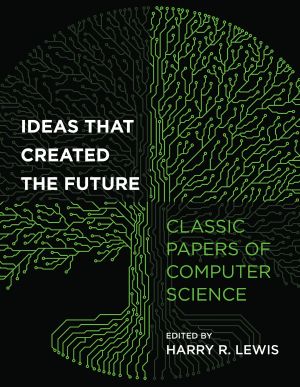Ideas That Created the Future, Classic Papers of Computer Science

- Authors
- Harry R. Lewis
- Publisher
- MIT Press
- Tags
- computer science; computer history; computer classics; computer science reader; algorithms; software; software engineering; computer survey; computer systems; science anthology; artificial intelligence; mathematics of computer science; computer science history; origins of computer science; aristotle; syllogism; logic; leibniz; calculus; binary arithmetic; ada lovelace; charles babbage; luigi menabrea; difference engine; george boole; boolean logic; propositional calculus; david hilbert; hilbert’s problems; diophantine equations; alan turing; turing machine; uncomputability; decision problem; howard aiken; mark i computer; harvard; ibm; harvard architecture; claude shannon; boolean logic; simplifying circuits; warren mcculloch; walter pitts; mcculloch-pitts neuron; threshold logic; john von neumann; von neumann architecture; eckert-mauchly computer ;hamming code; richard hamming; error-correcting code; hamming distance; corporation; arthur burks; herman; goldstine; vannevar bush; memex; associative memory; claude shannon; information theory; bit; entropy; alan turing; turing test; artificial intelligence; maurice wilkes; microprogram; microcode; grace murray hopper; compiler; univac; joseph kruskal; kruskal’s algorithm; greedy algorithm; minimum spanning tree; frank rosenblatt; neural net; norbert wiener; cybernetics; machine learning; computer ethics; j. c. r. licklider; human-computer interaction; hci; john mccarthy; lisp; list structure; metacircular interpreter; douglas engelbart; hci; human-computer interaction; mother of all demos; fernando corbató; ibm 7090; grace hopper; john backus; ctss; multics; ivan sutherland; light pen; computer graphics; constraint programming;gordon moore; moore’s law; exponential growth; edsger dijkstra; concurrent programming; joseph weizenbaum; chatbot; edsger dijkstra; semaphores; synchronization; mutual exclusion; structured programming; volker strassen; matrix multiplication; divide and conquer algorithm; c. a. r. hoare; program correctness; program verification; hoare logic; edgar codd; relational database; relational algebra; winston royce; waterfall model; software engineering; stephen cook; satisfiability; sat; nondeterminism; np-completeness; p vs. np; karen spärck jones; indexing; inverse document frequency; idf; richard karp; np-complete; satisfiability; nondeterminism; dennis ritchie; kenneth thompson; shell; multics; vinton cerf; robert kahn; arpanet; internet; computer network; tcp , ip; internet protocol; packet switching; barbara liskov; stephen zilles; object-oriented programming; frederick brooks; brooks’s law; robert metcalfe; david boggs; computer networks; whitfield diffie; martin hellman; public-key cryptography; donald e. knuth; algorithm analysis; big-o notation; richard demillo; richard lipton; alan perlis; program verification; ronald rivest; adi shamir; len adleman; public-key cryptography; rsa algorithm; adi shamir
- Size
- 17.10 MB
- Lang
- en
Classic papers by thinkers ranging from from Aristotle and Leibniz to Norbert Wiener and Gordon Moore that chart the evolution of computer science.Ideas That Created the Future collects forty-six classic papers in computer science that map the evolution of the field. It covers all aspects of computer science: theory and practice, architectures and algorithms, and logic and software systems, with an emphasis on the period of 1936-1980 but also including important early work. Offering papers by thinkers ranging from Aristotle and Leibniz to Alan Turing and Nobert Weiner, the book documents the discoveries and inventions that created today's digital world. Each paper is accompanied by a brief essay by Harry Lewis, the volume's editor, offering historical and intellectual context.